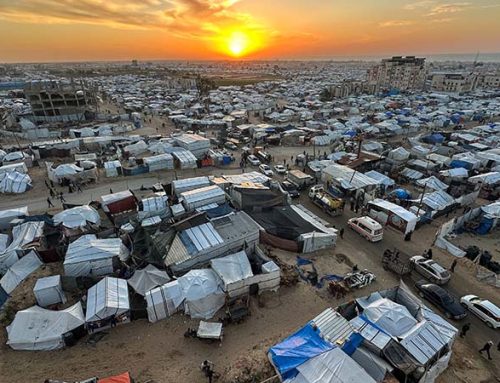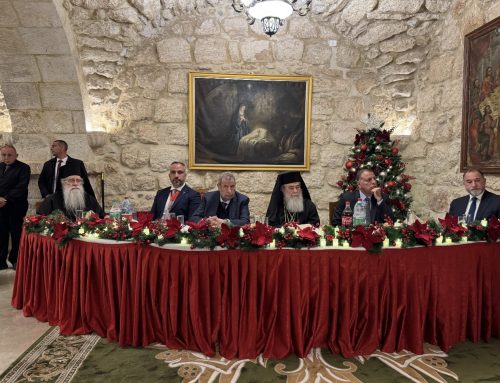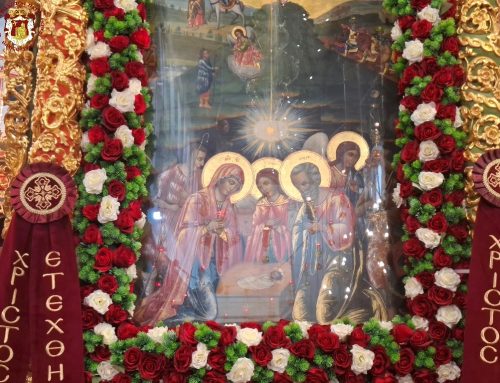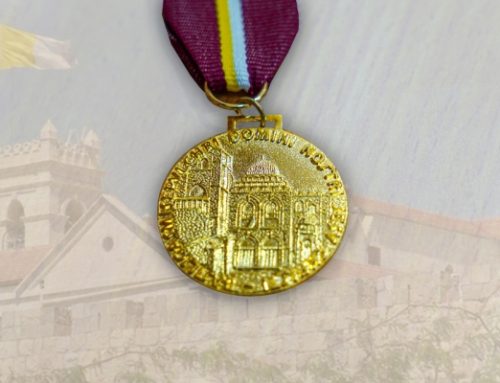HCEF
Background: Compelled by the Palestinian suffering, the Patriarchs and Heads of the Churches in Jerusalem recently issued a solemn declaration to the world on the terrible reality facing the Christians and others in the Holy Land. Their words summarize the anguish: ‘We hear the cry of our children.’
The Holy Land Christian Ecumenical Foundation (HCEF) has prepared the following excerpts of this document. The full text can be found at www.kairospalestine.ps.
This historic declaration, entitled Kairos Palestine 2009 was issued shortly before Christmas 2009. It declares: “We have reached a dead end in the tragedy of the Palestinian people.” It is written in the spirit of the South African Kairos declaration issued in 1985. That declaration proved to be a key landmark and turning point in the epic, decades long struggle against the oppression, the occupation, and the apartheid policies of the South African government.
The church leaders in Kairos Palestine declare: “the military occupation of our land is a sin against God and humanity.” They affirm the “clear position that non-violent resistance to this injustice is a right and duty of all Palestinians including Christians.”
Furthermore, they express the firm conviction that “liberation from occupation is in the inherent interest of all peoples in the region because the problem is not just a political one, but one in which human beings are destroyed.” They express the belief that arousing the conscience of all peace-loving people worldwide to this inhumanity will lead to the turning point for ending the present tragic situation.
The document lays out in painstaking detail the harsh conditions that exist under the Israeli military occupation of the Palestinian territories. It calls on “the international community to stand by the Palestinian people who have faced oppression, displacement, suffering and clear apartheid for more than six decades.”
It details the depressing reality faced by both Christians and Muslims alike in Palestine:
- “the separation walls have turned our towns and villages into prisons,”
- “the Israeli settlements ravage our land in the name of God,”
- “daily humiliations at the military checkpoints [occur] as we make our way to jobs, schools or hospitals,”
- “separation between family members make family life impossible,”
- “religious liberty is severely restricted, access to holy places denied under the pretext of security,”
- generations of refugees are relegated to live in camps under most difficult conditions,
- thousands of prisoners languish in Israeli prisons without judicial redress,
- “Israeli disregard of international law and international resolutions” is a reality,
- emigration of young people, Christian and Muslim alike, in the absence of any spark of hope for peace deprives Palestinian communities of their richest resources and future.
The church leaders decry the State of Israel’s justification of the foregoing measures as “self-defense, including occupation, collective punishment and all other forms of reprisals against the Palestinians.”
But even in the midst of this deepening, unending tragedy their people unjustly endure, the church leaders in the Holy Land affirm “our Christian word is a word of faith, hope and love.” They lay out the prophetic mission of the Church in the midst of this tragedy. They note that “the universality of the meaning of the [biblical] promises, of land, of the people of God [is] open to include all of humanity, starting from all the peoples of this land.” They declare “any theology…that legitimizes the occupation is far from Christian teachings, because it calls for violence and holy war in name of God Almighty, subordinating God to temporary human interests…”
They assert that Christians in the Holy Land must resist the evil of occupation, not “with death but rather through respect for life.” Furthermore, the goal is “not revenge but rather to put an end to the existing evil, liberating both the perpetrators and the victims of injustice. The aim is to free both peoples from the extremist positions of the different Israeli governments, bringing both to justice and reconciliation.” The church leaders express the conviction that this will happen as it did in South Africa and with many other liberation movements in the world.
The declaration concludes:
“In the absence of all hope, we cry out our cry of hope. We believe in God, good and just. We believe God’s goodness will finally triumph over the evil of hate and death that still persist in our land. We will see here “a new land” and “a new human being”, capable of rising up in the spirit to love each one of his or her brothers and sisters.”
Your comments on the Kairos document and the situation faced by Christians and others in the Holy Land are welcome. Please send them to: hcef@hcef.org.





